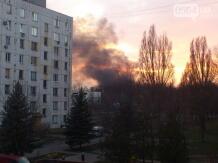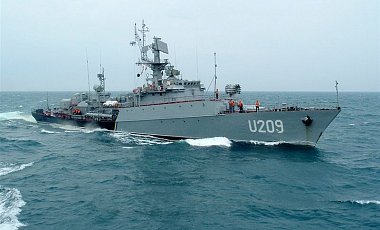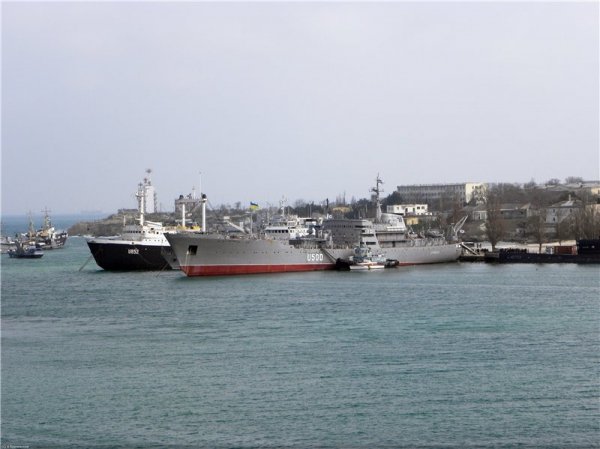As Russian troops and Crimean self-defence forces take over Ukrainian military positions, and Russia increases its threats on the global stage, there are signs of deescalation today. Will a greater crisis be averted?
Yesterday’s liveblog can be found here. For an overview and analysis of this developing story see our latest podcast.
Please help The Interpreter to continue providing this valuable information service by making a donation towards our costs.
Below, we will be making regular updates throughout the day:
2100 GMT: Gennady Timchenko, who was placed on the US sanctions list today, has sold his shares in the Gunvor oil trading company. Gunvor, in which President Putin is believed to have major personal investments, issued a statement today announcing that Timchenko, who owned a 43% stake in the company, had sold his shares on Wednesday, ahead of the sanctions announcement. The Gunvor statement reads:
Anticipating potential economic sanctions so to ensure with certainty the continued and uninterrupted operations of Gunvor Group Ltd’s activities, the shares of the company held by Mr. Gennady Timchenko were sold on March 19 from his personal holding vehicle to Mr. Torbjorn Törnqvist personally. As a result, Mr. Törnqvist has become the majority owner of Gunvor Group Ltd, with an 87 percent stake, and Mr. Timchenko has fully divested his entire holdings in the company. The remaining 13 percent of shares are held by senior employees of Gunvor. There are no outside shareholders.
Gunvor categorically denied that Putin has any investments in the company. It remains to be seen if this move has saved the company from any repercussions of US sanctions against Russia.
1919 GMT: More information on two of the Ukrainian ships seized by Russian forces earlier today: Reuters reports:
The Russian national tricolor and the Russian navy flag were flying on Thursday on a pier in the Crimean port of Sevastopol where two Ukrainian navy corvettes were anchored, suggesting the warships were seized.
There were no flags on display on the sterns of the corvettes – called Lutsk and Khmelnitsky – where the national symbols would normally be visible.
“It appears the Russians have taken the flags down at both ships but not put out their own,” said Vladislav Seleznyov, a Ukrainian military spokesman in Crimea.
Lutsk is a Grisha V class anti-submarine corvette, while Khmelnitsky is a Pauk class patrol corvette.
5 Channel has photos and some footage from the Russian capture of the Khmelnitsky here:
Prominent Russian blogger, Rustem Adagamov, has a number of photos of the assault on his livejournal:
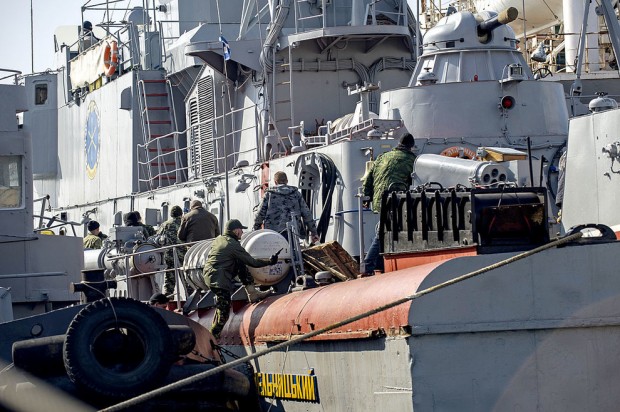
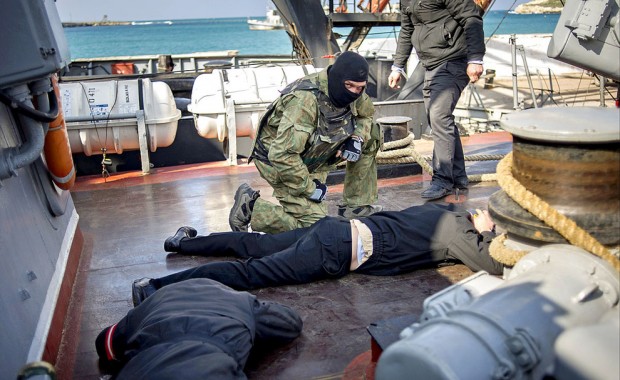
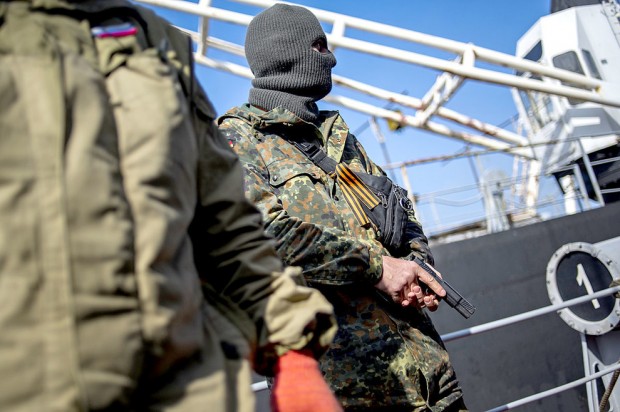
Note the St. George ribbon.
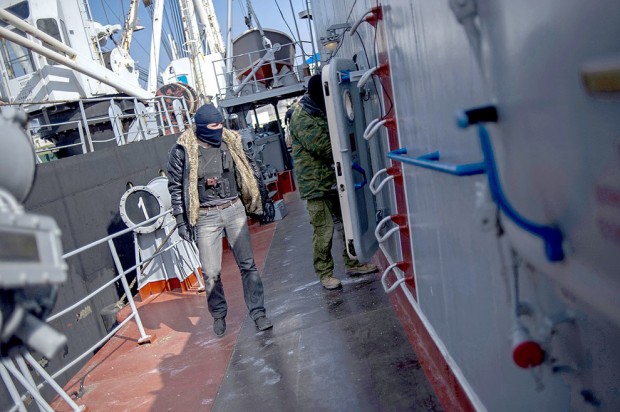
1907 GMT: In Kryvuy Rih, a central Ukrainian city (map), a group of combat tanks from the 17th Tank Division is on fire. Explosions and gunfire can be heard, but this could be “cook off” as ammunition inside the tank explodes.
#Ukraine MoD reports fuelled/combat loaded tanks on fire at base at Kryvyy Rih, Dnipropetrovsk region. No word on casualties or cause yet.
— John Schindler (@20committee) March 20, 2014
Is this an accident? Sabotage? It’s unclear.
1811 GMT: 15-20 armed men stormed the Ukrainian corvette “Ternopil” in Sevastopol Bay, Crimea, according to the Ukrainian Defense Ministry. The Ternopil is a small anti-submarine ship.
AFP adds more details:
On Facebook, [Vladislav Seleznyov, the defence ministry’s spokesman in Crimea] said pro-Moscow militiamen and Russian soldiers cordoned off the area, while a boat with the gunmen on board approached the Ternopil and stormed it.
“Stun grenades were used during the assault and automatic fire was heard,” he said.
1618 GMT: Out of the 20 Russian officials and “cronies” hit by these new sanctions, we’d like to point out two of the ones highlighted by the International Business Times:
Arkady and Boris Rotenberg The most influential businessmen in Russia. They were judo sparring partners with Putin and remain close. From 2008, the Rotenbergs started acquiring subsidiaries of Russian energy giant Gazprom and built them into Stroygazmontazh Corporation (or SGM Group), one of the biggest construction contractors in the energy field. Arkady is the president of the multi-championship-winning hockey club Dynamo Moscow. His net worth is $4bn, according to Forbes.
Gennady Timchenko One of the most powerful people in Russia and co-owner of the international energy traders Gunvor Group. He is a close friend of Putin. He is chairman of the board of KHL, the Russian national hockey league, and president of the SKA St Petersburg Hockey Club. In December, he was awarded the Order of Friendship from Putin, an important government honour.
Then there are those who do business with Putin:
US Treasury states “Putin has investments in Gunvor and may have access to Gunvor funds.” Timchenko and Putin have always denied this.
— Tony Halpin (@tonyhalpin) March 20, 2014
Big news for the #oil trading industry: US Treasury says “Putin has investments in Gunvor and may have access to Gunvor funds.”
— Jack Farchy (@jfarchy) March 20, 2014
US Treasury: “Kovalchuk is a close advisor to President Putin and has been referred to as one of his “cashiers.”
— Tony Halpin (@tonyhalpin) March 20, 2014
1608 GMT: Russia immediately responded to Obama’s announcement of new sanctions by releasing its own sanctions list (likely a pre-drafted list) of US officials.
After Pres. #Obama‘s remarks, #Russia quick to respond: Sanctions against US officials & lawmaker including @Rhodes44, @SenJohnMcCain & more
— Maks Czuperski (@MaksCzuperski) March 20, 2014
9 US pols on #Russia list: Caroline Atkinson, Dan Pfeiffer, Ben Rhodes, Harry Reid, Boehner, Bob Menendez, Mary Landrieu, McCain, Dan Coats
— Peter Spiegel (@SpiegelPeter) March 20, 2014
Interestingly, the lists have some parallels, with both executives and legislators being mentioned. The difference — it’s not all that likely that these American government officials have significant wealth tied up in Russian banks.
Spokesman for @SpeakerBoehner: “The Speaker is proud to be included on a list of those willing to stand against #Putin’s aggression.”
— Peter Spiegel (@SpiegelPeter) March 20, 2014
1555 GMT: The full list of Russian officials sanctioned by the United states has been published on the Treasury Department website. It’s a virtual “who’s who” if Russia’s elite. A few key additions: Russia Railways executive and close friend of Putin’s, Vladimir Yakunin; many leaders of the State Duma; and a large chunk of Putin’s executive team.
Remember how Barack Obama was a bit worried about the Magnitsky list? Well now he has just hit President Putin’s closest circle.
— Daniel Sandford (@BBCDanielS) March 20, 2014
There are some people missing from the list:
Medvedev must be pretty pissed off. Even Obama doesn’t rate him enough to impose sanctions…
— Tony Halpin (@tonyhalpin) March 20, 2014
1542 GMT: A series of announcements related to the new US Sanctions passed against Russia.
US official says several of those sanctioned are close confidants of Putin’s, inc friend since ’93 & one who’s chairman of Russian railways.
— Hannah Allam (@HannahAllam) March 20, 2014
US official: ‘Crony’ Bank Rossiya provides services to officials. Many of the designated hold accounts there; it’s controlled by a crony.
— Hannah Allam (@HannahAllam) March 20, 2014
US official: Rossiya is 17th largest bank in #Russia, $10 bln in assets, has $ accounts w/US banks. ‘It will be frozen out of the dollar.”
— Hannah Allam (@HannahAllam) March 20, 2014
US official: Exec order allows targeting of ‘key sectors’ of #Russia economy: financial services, energy, metals/mining, defense&engineering
— Hannah Allam (@HannahAllam) March 20, 2014
Today’s sanctions hit Putin’s inner circle & friends. Incl many w assets abroad & do business outside #Russia. Big diff from Monday’s round
— Kirit Radia (@KiritRadia) March 20, 2014
The US is also making more military moves:
US official: We’re concerned by Russian military movements…would be a ‘substantial escalation’ for Russia to move into south/east Ukraine
— Hannah Allam (@HannahAllam) March 20, 2014
US official: We’re in touch w/Ukrainian military about how they’re responding; Pentagon also reviewing nonlethal support we’re providing
— Hannah Allam (@HannahAllam) March 20, 2014
But Russia is firing back. It says it has passed its own sanctions. Details when we have them…
1537 GMT: An update to the story we reported on earlier, the arrest of a prominent Ukrainian businessman, Dmytro Firtash, by authorities in Vienna
(jump to update 1406):
Fantastic! Firtash posted 125m € bail, but the court in #Austria did not accept it & immediately began an investigation for money laundering
— Thomas C. Theiner (@noclador) March 20, 2014
1522 GMT: Barack Obama has made a statement on Ukraine, and has announced new sanctions. New Russian leaders, individuals who provide “material support” for those leaders, and a bank that does the same, will all fall under the new sanctions. See the video below, the statements start at the 27:13 mark:
1515 GMT: France is not making a decision on the suspension of the sale of amphibious assault ships to Russia. RFE/RL reports:
France is delaying a decision on whether to suspend the sale of two advanced warships to Russia in response to the annexation of Ukraine’s Crimea.
French Defense Ministry Jean-Yves Le Drian said on March 20 that a decision on a possible suspension of the 1.2 billion euro ($1.4 billion) contract need not be made before October when the first ship is due to be delivered.
Le Drian also said that a suspension of the contract could only happen as part of a larger package of EU economic sanctions against Russia.
And this brings us to a new “catch-22”: Assuming that Russia does not invade the rest of Ukraine or anywhere else, the EU may not pass new sanctions on Russia. But the delivery of four Mistral-class amphibious assault ships will make it much easier for Russia to invade places like Georgia and Ukraine.
1500 GMT: Andrew Bowen is exploring the close economic ties between Moscow and London. It is these ties that have prevented the UK from sanctioning Russia over its annexation of Crimea:
When Ben Judah penned his piece “Why Russia No Longer Fears the West” in Politico– exposing the integral role of London in enabling the continued autocracy that is Putin’s Russia (like the fact that Rosneft, Gazprom and steel producer Severstal are all listed on the London Stock Exchange and is the hub for the $181 billion in Russian business Merger and Acquisition activity over the last two years) and why a serious response to Russia’s aggression in Crimea would include serious financial sanctions — it was met with defensive vitriol in defense of London’s welcoming status for all people’s—oligarchs and companies close to the regime included…
As the WSJ recently reported; “from 2004 to 2013, the combined total of bonds and loans raised by Russian businesses in London was nearly $400 billion, including about $47 billion last year alone, according to Dealogic. Banks charge fees of up to 3% of the amount borrowed, or about $1.2 billion a year on average over the past decade.”
Read the entire article: Why London Is So Crucial To Putin’s Russia
1449 GMT: Russian public opinion of the United States has fallen sharply in the last year, with most of the movement happening in only the last few months:
Russians who see US negatively, via @levada_ru: March 2012: 35% March 2013: 39% January 2014: 44% March 2014: 56% http://t.co/L35JLJ2UX0
— Kirit Radia (@KiritRadia) March 20, 2014
One interesting thing about the poll — attitudes towards Ukraine, the United States, and the European Union were at their lowest during the Orange Revolution and this current crisis (the US also had near record lows during the period of the invasion of Iraq.
1418 GMT: Russia’s parliament has approved the annexation of Crimea — ALMOST unanimously:
Parliament votes 444 to 1 for annexation of Crimea. @iponomarev the lone voice of sanity/Russophobic fifth columnism (delete as appropriate)
— Shaun Walker (@shaunwalker7) March 20, 2014
1406 GMT: Last week, Dmytro Firtash, a fugitive Ukrainian oligarch, was arrested in Vienna. The story barely made any headlines, however. The Interpreter’s editor-in-chief Michael Weiss reports for Foreign Policy:
Buried in the news of Russia’s invasion, and now annexation, of the Black Sea peninsula of Crimea was the second most important event to affect the new Ukrainian government last week — and it happened in Austria. On the evening of March 12, one of the most notorious Ukrainian oligarchs, Dmytro Firtash, whose fortune has been estimated at anywhere from $673 million to the tens of billions, was arrested in Vienna, right outside of one of his offices in the Margareten district.
Weiss goes on to investigate the financial ties that have earned Firtash the title of “the shady billionaire at the heart of Russia’s energy stranglehold over Kiev.”
Firtash is simply too good of a political target and the timing, too suspicious. According to Standard Bank analyst Timothy Ash, Firtash “has close ties to Russia via the energy sector, and perhaps even to [President Vladimir] Putin.” One of the oligarch’s chemical companies, Ash notes, got large discounts from Gazprom, Russia’s state-controlled gas giant, at a time when Naftohaz, Ukraine’s state gas company, was paying premium prices for imports. The ownership of the Swiss-registered gas trading company RosUkrEnergo is also almost evenly divided between Firtash and Gazprom, indicating that the Ukrainian oligarch was a close partner of the Kremlin.
“The arrest is not a coincidence,” former U.S. Ambassador to Ukraine William Taylor, told Foreign Policy. “I suspect there are many Ukrainian businesspeople who are very nervous at this point. The United States has put sanctions and visa bans on a few individuals, and Firtash would be a leading candidate. He clearly supported President Yanukovych.” The timing of the arrest might have been opportunistic, but the investigations of criminal activity were very real — and U.S. law enforcement agencies had been closing in for some time. Indeed, Taylor said he suspected that the Austrian operation had something to do with longstanding allegations that Firtash is tied to organized crime in the United States and Europe.
Read the entire investigation: Married to the Ukrainian Mob.
1346 GMT: Ukraine’s 5.ua reports that this morning, at 9 AM, three Ukrainian naval ships were apparently captured by Russian or pro-Russian forces, and Russian flags have now been raised. The ships include the “Donbass”, a rescue tug and a fire boat. Pictures have been posted, but they may be file photos.
1340 GMT: Further illustrating the tension between escalation and deescalation in Ukraine, late yesterday Ukraine announced it would implement a visa regime for Russians. Today, Russia has fired back by closing its borders to at least some, but possibly all, Ukrainian products. Pravda reports (translated by The Interpreter):
“The Russian Federation has closed it’s borders to Ukrainian products – market insiders:
On March 19, at 22:00 Ukrainian time, Russia completely closed it’s borders to Ukrainian produce.
This was reported by APK-Inform: Vegetables and Fruit citing market insiders.
According to representatives from Ukrainian transport companies, vehicles carrying Ukrainian goods are not passing Russian Federation customs checkpoints. Carriers have been given no explanation at all for this.
“They’re just sending vehicles back into Ukrainian territory. They’re not even giving them a look over” say exporters. “The customs officials are offering no reasons for their actions and they can’t provide any documents.”
As a result, traffic jams have formed in the neutral territory between Ukraine and Russia: the queue from the trucks is already estimated in kilometres.
“In this situation, greenhouse growers can suffer the most, firstly, cucumber growers. All of the major greenhouse growers in the country sell more than half of their harvest on the Russian market. Given this fact, project experts are predicting a sharp collapse in domestic cucumber prices due to the glut resulting from the cessation of exports, and Ukrainian greenhouse producers may suffer serious losses”, commented APK-Inform
1328 GMT: Signs of deescalation? Ukrainian troops are making efforts to evacuate their bases in Crimea. Reuters reports that Ukraine border guards have already begun to pull back. All’s quiet at Belbek airbase, where there was a brief escalation last night, and the hope is that the rest of Ukraine’s bases can be handed over to Russian troops with no additional bloodshed.
Quiet Belbek base. Commander tells us #Russia and #Ukraine defense ministries working on peaceful handover. pic.twitter.com/DafzokTI9C
— Alexander Marquardt (@MarquardtA) March 20, 2014
That said, Russian forces have now taken control of Ukraine’s naval base in Sevastopol, and tensions remain:
Amid signs the uneasy standoff between pro-Russian and Ukrainian forces could ignite into bloody conflict — a day after Moscow claimed Crimea as its own — almost 300 armed pro-Russian supporters took over the naval base in Sevastopol, said Marina Kanalyuk, assistant to the commander of Ukraine’s navy fleet.
“They are everywhere here, they surround us, they threaten us,” she said, adding that she was sure that Russian security forces were involved.
Kanalyuk said the 70 or so Ukrainian naval officers at the headquarters had tried to stop the armed men from entering and were negotiating with them. She said that the armed men had replaced Ukrainian flags with Russian standards but that no shots had been fired.
But several hostages, including the Ukrainian Navy Commander Serhiv Hayduk, have been released after he and several other hostages were captured by Crimean and Russian forces during the incident:
Ukraine’s interim president Olexander Turchynov said the naval forces commander Serhiy Hayduk and other hostages, including the son of a Ukrainian lawmaker and former minister, were released overnight.
“Commander of the Naval Forces of Ukraine Serhiy Hayduk and civilian hostages who had been illegally seized by the Russian Armed Forces in Crimea have been liberated this night and are on the way to Kiev now,” the president’s office said.
Among those held captive was the son of Anatoliy Hrytsenko, who served as Ukraine’s defence Minister from 2005 to 2007, the president said.
However, only last night Ukraine’s ambassador to the UN told the security council that open war could be on the horizon:
“There are indications that Russia is on its way to unleash a full blown military intervention in Ukraine’s east and south,” Yurii Klymenko said.
His statement was widely supported by other UN ambassadors, but challenged by a Russian diplomat, who read a prepared statement justifying Russia’s actions so far.
So, while there is deescalation in the diplomatic back channels, and perhaps in the streets of Crimea, there is actually heightened rhetoric. Still, risk of open military confrontation in Ukraine may be lower than it has been since Russian troops first invaded Crimea weeks ago.
